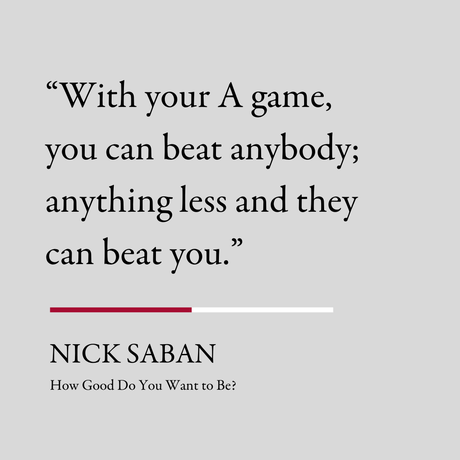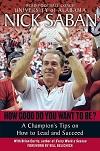
Nick Saban is widely regarded as one of the best football coaches on the planet. No matter how you feel about Alabama and Saban, you can appreciate that the man knows how to win football games. He has won a record six national championships.
His leadership, How Good Do You Want to Be?, ranks as one of my favorite books for coaches and was written before he moved to Alabama, just after he won his first national football championship at Louisiana State University.
The book breaks down the leadership and coaching philosophy that Saban uses to marshal the best efforts of a large group of young men in the pursuit of a singular goal.
Saban is all about focusing on the process, having realistic expectations about the difficult of difficult goals, and showing up and leading and doing the work on a daily basis.
Here are some of the key quotes and passages from How Good Do You Want to Be?, as well my own thoughts and notes on Saban’s philosophy.

Where to Buy — How Good Do You Want to Be? by Nick Saban
Paperback (Amazon) | Kindle eBook
“The opponent should never determine your level of competitive spirit.”
“One thing about championship teams is that they’re resilient. No matter what is thrown at them, no matter how deep the hole, they find a way to bounce back and overcome adversity.”
“It was our resiliency that allowed us to overcome our own errors and mistakes.”
His philosophy of making the most of each play and not basing your effort off the score echoes Bill Walsh’s The Score Takes Care of Itself philosophy: “’Don’t look at the scoreboard’ is one of my philosophies.’”
“Every time you think of winning the national championship—stop. Instead, think of what you have to do to dominate your opponent for sixty minutes.”
The attitude of a champion doesn’t sleep: “Champions take an attitude of dominance everywhere they go.”
“In my three decades of coaching, I’ve learned that the process is much more important than the result.”
“In life, your road map is knowing what you want to accomplish then committing yourself to doing the things necessary to reach that destination. You cannot get there without hard work and perseverance.”
“Try to avoid specific parameters and benchmarks; instead, focus on the larger process of where you want to go.”
“The major by-product of creating a mission statement and vision for you or your organization is that it creates a culture of expectations. If you have clearly defined who you are and where you want to go, then there is no longer any need for debate about it… everyone knows what to expect.”
A culture that is created from the team builds accountability. “The fact that the players have input into this system heightens their awareness of how they can affect one another to make the correct decisions. The peer intervention motto is, ‘What you do, you do to everyone in this room.’”
Expectations predict effort. “If you expect things to be difficult, it will always be easier to solve problems, overcome adversity, and have an enthusiastic energy about how you go about and enjoy your work.”

“Ultimately, it is up to individuals to decide who they want to be. You can encourage behavior and success, but you cannot dictate it.”
“We live in a results-oriented world, but those who can handle the hard work that it takes to be successful will always be more prepared to take advantage of opportunities.”
How you do your work matters. “So many people spend so much time figuring out ways to beat the system, to get around the rules, to finish before others, that quality is often lost—and one can never have a real sense of accomplishment that way.”
Investing vs spending your time: “Investing time means spending it for a worthwhile purpose: to work towards something, to accomplish something that will help you achieve.”
“Promise a starting time, but not a quitting time.”
“Sometimes the process of success takes time to develop. Our society gears young people to expect immediate results and affirmation for their efforts.”
“Your disposition and expectations about what it will take to get you where you want to go are truly the core of not getting frustrated by the task at hand. Expect it to be hard.”
“You persevere when you can look adversity in the eye and see it as a challenge.”
“Adversity creates opportunity.”
“It is important to remember that we all experience both success and failure. No one person is a success and another a failure.”
“Putting things in perspective affects how you react, which in turn affects the potential positives resulting from the challenge.”
“Not only should you not concern yourself with the score, you should also avoid setting the bar or establishing benchmarks for success.”
“On the field, a player who looks up at the score to find he’s losing by 28 points is not likely to play as hard as if the score were tied. But he should, if it is most important to give your best on each play.”
“Worry about the things that you can control in your life, both professionally and personally. Don’t worry too much about whether or not people like you, and don’t get anxious about an impending situation. You can’t control these things. Spend your time working on what you can control—your actions, words, and emotions. There’s an old saying that points out that you can’t do much about how hard the wind is blowing, but you can adjust your sails.”
“Being focused does not mean having tunnel vision… Tunnel vision is like looking at the world through a straw… Focus is an ability to zero in on what’s important and being able to avoid distractions to complete the task.”
Maintaining success is difficult: “…champions lose focus because of the distractions that success brings. The championship becomes the focus—not what it takes to be a champion… The best advice is to go back and prepare as if the success never happened.”
There are lessons to be found in success and failure. “It’s not natural for most people to listen and learn after having success, but quality control should work—win or lose… When you play poorly and still win, that’s the kiss of death. It doesn’t send a good message.”
Because we’ve always done it that way is not a good excuse for doing something. “Be flexible enough to know if what you are doing is actually contributing value or you are doing it because you’ve always done it that way.”

Change is scary, but it’s inevitable. For some, “change is worse than suffering; they would rather be unhappy in their present state than take the risk of change to find happiness. Don’t be one of those people.”
Protect the team. “Emphasize to every person that the actions he takes, both positive and negative, have an effect on everyone.”
“It’s easy to keep everyone content and working hard when things are going well—but it’s when things go bad that a team’s character is revealed… A team that falls apart was never truly a team—there was never trust.”
Chronic underappreciation is a sign of the “disease of me.” Some players and team members will “demand constant attention and sulk when they believe, rightly or wrongly, that their skills and efforts are being underappreciated. It leads to jealousy and bad chemistry.”
Beware of groups and cliques within the team. “These cliques separate teammates and create a combustible climate… Cliques form when there is a leadership vacuum.”

“If you think you are dominant, you will be… You can be dominant without disrespecting competitors or sacrificing what you believe in. Develop an attitude that you simply cannot be beaten—that you are an overpowering force.”
“Dominant teams not only don’t care where they play, they relish the challenge of going into someone else’s home and overcoming the adversity created by the environment.”
“Just because you are dominant does not mean you are infallible… Dominance does not mean perfection.”
“Dominant people don’t care what the score is… Just because you’re ahead doesn’t mean it will always be that way, so don’t look at the scoreboard, and keep doing what you’ve been doing to be successful.”
“Leaders are people who are willing to follow when it is called for.”
“Times of adversity are when we need leaders the most… It’s easy to lead in good times, but the difficult times present an opportunity to display true leadership.”
“In your life, only you can decide what is worth going to battle for, keeping in mind what may be sacrificed in the process. One of the things that experience gives us is ab ability to sense how much roadkill it takes to get home.”
“Sometimes, when there is a dominant leader, the rest of the team backs down from individual responsibility and depends on that one person for direction.”
“Do the right thing… Do the right thing when no one else is around. Do the right thing when temptation tells you otherwise. Do the right thing all the time.”

Paperback (Amazon) | Kindle eBook
More Resources:
Lead Like a Champion: 5 Must-Read Books for Coaches. These are my favorite five books for coaches and leaders from some of the top coaching minds on the planet.
Check out this list of my favorite mental toughness books for athletes.
